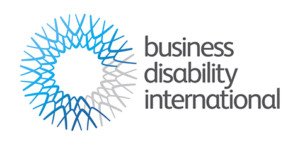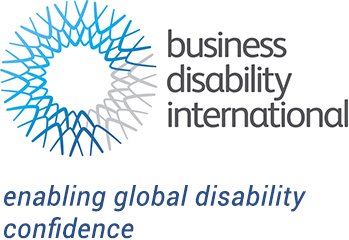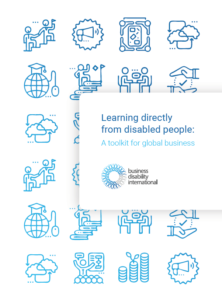

“Why are you pretending to be ‘normal’?”
Discussing ‘disability ordinariness’ with Phil Friend
Click to Tweet: Discussing the importance of making #disability ‘ordinary’ in business and in society with Phil Friend @bizdisint @1bullstag #sonewbrain
Phil, you’ve been operating in the disability world for a long time, what do you now consider as your ‘day job’?
Well there are two main elements to what I do. At a commercial level through Phil & Friends, I work with a number of large corporations and public sector organisations around challenges linked to disability and employment, then increasingly I play a role in the third sector through my roles in charities as Chair or Trustee. Fundamentally I am focused on the social inclusion of disabled people.
I notice you’ve recently started the Phil & Simon show with Simon Minty, tell me about the role of humour in your field?
Simon and I have a long standing relationship through business and friendship, and with that comes candour; we have great, often entertaining, conversations and despite differences in age, context, perspective we enjoy trading views and opinions usually with laughter and without causing offense. We felt the podcasts offered a good platform to share some of these discussions about important issues, often through a disability lens. So far the feedback has been really positive so I suspect we’ll carry on!
Of course in any field humour is a pretty standard approach to breaking the ice and dispelling tension, but with disability people are REALLY scared of saying, or doing the wrong thing.
I’ve seen it so many times, senior leaders want to say and do the right thing; they don’t want to embarrass, offend or patronise people. I always maintain that most people understand ‘intent’. If your intention is to be inclusive and do the right thing, most people will see beyond the exact words and will understand your intent.
If you’re trying to be clever and put people down, well then you probably get what you deserve! From my perspective, I’d rather people felt they could speak up and say something, rather than ignore me because of potential embarrassment.
I’ve been working in disability since the late eighties, and amazingly this is a perennial issue. You’d think it’d be improving by now as society becomes more tolerant of difference, but it doesn’t seem to. Perhaps the younger generation have less anxiety about labels?
What role do you think schools and education have to play in changing attitudes to disability and increasing social inclusion? Your own experience of ‘special schools’ is very different to the current trend to mainstream everyone as much as is appropriate and possible.
I think that’s right – I’m very supportive of integration and the inclusion of children with disabilities in mainstream education as much as is appropriate and possible. There will doubtless always be a need for ‘special schools’ in certain circumstances, but inclusion of children with disabilities will certainly increase understanding and reduce the stigma of disability for the next generation.
That said, co-education hasn’t stopped men from treating women badly; we still see sexism, chauvinism and performance gaps between the genders. I suspect disability in mainstream education is the same, perhaps what is most important is really helping youngsters to develop the right attitude through learning, to understand the value of, and feel comfortable with, ‘difference’.
There have been several stories in the press recently about the greater challenges for women with disabilities, linked to everything from employment to image to refugees fleeing conflict? Do they ring true for you?
Well when it comes to image I think women with disabilities can have a difficult time with ‘body fascism’ and today’s celebrity culture. I think many young women struggle with the pressure to fit a stereotypical image and to follow fashion, imagine adding disability into that mix. It raises real challenges of self-esteem and exclusion, but it’s not only women that feel that pressure, many men are increasingly affected and self-esteem can be a real challenge for those living with disabilities, particularly in the workplace.
So tell me a little more about that, about the role of employers in supporting their disabled colleagues, particularly in relation to self-esteem.
To help people understand how I see the world I often say that ‘I dream in a wheelchair,’ as this is quite “normal” for me. That is not true for most people living with a disability. Most of them acquire their disability post birth, and often during their working life, and that requires fundamental changes to how you live, work and how you perceive yourself.
78% of the UK population acquire their disability after the age of 16
Your employer can play a crucial role in supporting you OR not as the case maybe. Just as your family and friends naturally support you through life, so your employer, your work team and the other colleagues who know you can play a critical part, by reassuring you and encouraging and enabling you to continue to work and be productive, all of which has a huge impact on self-esteem….or not.
It’s a real challenge for organisations to know what to do to retain talent when faced with the onset of a disability; they need to take action quickly and often their staff are not sufficiently skilled or empowered to know how best help and this can lead to demoralisation and ultimately the talent ends up leaving, which is good for no one.
In your commercial work which aims to ensure that employers are capable of adapting to disability and of supporting disabled customers and colleagues, what are your proudest achievements?
After years of working in organisations, I’ve concluded that it is our work designed to support line managers that has had a huge impact and I’m really pleased about that. We have to help companies ensure that their line managers, who are at the front line of everything, are upskilled and confident enough to manage disability, and that can make a real difference.
The other chunk of work that’s become increasingly important is working directly with disabled employees. The employer can do a lot to ensure that they adapt things and are flexible by removing any disabling barriers which prevent a disabled employee from being really effective. The disabled individual also has to do their bit to be effective. It is about them owning and managing their impairment and understanding what they need in order to be effective, and then communicating it to their manager. Personal Development Programmes provided by the employer can really help to raise confidence and ensure that the disabled employee is able to be assertive about their needs. Many organisations now have employee disability networks in place, and these can be hugely helpful. Kate Nash has done amazing work on this area, but the real challenge is to raise personal confidence levels.
In order to succeed, disabled people need to have the right mindset and use appropriate language when talking about their impairment. By being open about say a mental health condition, accepting it and owning it, they can clearly articulate what they need to be more effective. Ensuring that they get the right reasonable adjustments is a vital component of employee effectiveness
So if you were to give any advice to a senior leader about making their business more inclusive what would you say?
Ensuring a supportive and welcoming culture will encourage people with non-visible impairments to be more open. I would encourage them to concentrate more attention and resource on encouraging disabled employees to own their disability, to be clearer about what they need, and to create the opportunities for disabled employees to talk and engage, through disability networks or personal development programmes.
They also need to focus on their line managers and ensure they have the skills and confidence to manage disabled colleagues.
It’s also about showing real leadership. Senior leaders need to ‘get’ disability, to be able to operate and communicate without embarrassment if they are to drive change and transform the culture of their organisation.
Mentoring and meeting disabled people can help to build confidence and once the leaders feel comfortable and knowledgeable about disability they will be more successful at embedding the right attitudes and behaviours within their organisation all the way from grass roots upwards to managers.
Having worked on disability at an international level, what have you observed about the key differences in other countries and areas?
I’ve worked in Estonia and the US, and of course the challenges are different. Lack of legislation plays a part, but its more than that. In Estonia, employment of people with disabilities is a long way behind the US and the UK, there is a lack of investment in supporting disabled people in education and socially that leaves them without the right skills required for employers. In Estonia there is a need to focus at local level communities rather than the general population, the challenge is further downstream compared to the US.
In the US, that earlier investment is there, so they can focus more on programmes like apprenticeships, work experience and local partnerships to get disabled people into work as the basic foundations are stronger.
Increasing the number of disabled people in employment is a slow process that needs to be part of the culture of an organisation, things don’t change overnight. A good example of a talent programme for disabled people is the Extend scheme at the BBC which has been running for many years and is really, finally beginning to impact on the representation of disability in the organisation and in the media.
So what role can and should global organisations play in supporting their disabled talent?
In our society, the basic unit that provides support is the family. In a corporate organisation, the basic unit of support is your immediate line manager, who, like your family, very often holds the key to whether or not you get the support you need in order to be successful. Changing the culture and policy has to really happen top down, driven by senior leaders, but fundamentally you need to reach and impact on your line managers in order to really change an organisation, its culture, beliefs and actions.
At an international level, culture and religious beliefs can make this even more challenging, if for example the prevailing culture sees disability as a kind of punishment or it is shameful this will make it very difficult to get a local employer to hire disabled people. At this level, education to dispel myths and misconceptions, is vital.
Have you seen any particularly impactful ways that change perceptions?
I think role models are part of that, actually seeing people with disabilities in senior positions in society showing that they can do the job. In the UK, David Blunkett was a powerful role model for aspiring disabled people in politics, but there aren’t enough of those people around, especially in the business world or internationally.
Do you see that the forthcoming Paralympics has a role to play in providing disabled role models at a global level?
Of course it does, but we need to remember that competing in the Olympics or Paralympics is about being the absolute best at your sport, hence the ‘Superhuman’ strapline is appropriate whether applied to Usain Bolt, the fastest man on earth or Baroness Tanni Grey-Thompson, one of the most successful wheelchair athletes of all time.
Most disabled people are not ‘superhuman’. We are pretty ‘ordinary,’ just like everyone else.
We need more ‘ordinary’ role models with disabilities who have been successful in business, not just in sport, who can share their stories to inspire others all around the world. It’s also about getting these role models to talk about how their disability has had a positive impact on their career and how they have managed it.
We often hear that disabled people are good problem solvers, but the disabled individual sometimes fails to realise this and therefore doesn’t translate this problem solving skill into a business advantage. When I run personal development programmes, I get people to think about all the things they have to manage on a daily basis related to their disability, things like managing medication and transportation, opening challenging sandwich packaging in the staff canteen when you only have one arm! They rarely view their organisational, problem solving and planning skills sets as potential competencies and career assets.
‘Disability ordinariness’ is a very powerful statement, I really like that term. Where have you seen that ‘disability ordinariness’ actually achieved?
Well disability is everywhere, so we should be seeing it, in the media, in business, in public life. Things have improved in the broadcast media, we see disabled presenters, we see them in our soaps, but the best example I have was my personal experience of travelling to Canada. Something about travelling around the country unnerved me, and then I realised what it was! The place completely accessible: my hire car had hand controls fitted, I took the bus without having to think or plan or fighting battles to board it, I could easily access the conference that I was attending. It was really strange! When I asked my disabled peers at the conference about accessibility, this guy summed it up brilliantly ‘Of course, why wouldn’t we make everything accessible, what would be the point of that?’
Making disability ‘ordinary’ should be the aim. We sometimes use the phrase ‘business as usual’ but large corporates should be asking the questions ‘why wouldn’t we do that?’ not ‘why should we?’

Of course, your experience in Canada isn’t the norm yet. Where have things been a little more challenging?
Well I had an extraordinary experience in Estonia, I was with a group of disabled people who were transported regularly by minibus to a day care centre. Staff then had to carry the people in wheelchairs into the day care centre for disabled people, as there wasn’t a ramp. However, what seemed to make this ok for the disabled Estonian was the attitude, there was no apology or political correctness, people were proud that it was their job to carry you in. That ‘can do’ attitude is so important to overcoming problems. In this scenario ramps are the answer of course! I spent time trying to encourage the day centre users to kick up a fuss about the lack of access. I should go back and see if it has changed!
Conversely in the US I was travelling alone and collected my hire car at JFK airport. I was using the tail-lift to get into the van and it got stuck. There was no one around to ask for help, so with no other option I called 911 to ask for help. The police officer I spoke to simply told me my situation wasn’t critical and hung up saying ‘Have a nice day!’ Luckily through using my briefcase as hammer I managed to get the lift working and went on to have an amazing trip travelling solo around the US, which is generally pretty accessible.My story simply shows how when one little thing goes wrong it can colour your whole experience or perception of a company or a country. We’ve spoken about the BBC and the positive work they have been doing for many years on disability. Yet at that crucial and public moment in 2000 where Baroness Tanni Grey Thompson won an Award at the BBC Sports Personality of the Year, they realised moments too late that there was no ramp up to the podium. So in front of millions of viewers they had to present her award in the audience not up on stage. Of course they apologised and there was no ill feeling, but it shows how important meticulous preparation isto ensuring that good intentions are translated into reality.

It still amazes me how companies still don’t think things through, what about the whole customer journey?
Cruises are naturally targeted at an older demographic, but they haven’t considered the whole customer experience. Heading to a cruise in the Caribbean I was subjected to a 12hr flight where I couldn’t use the toilet as it was not accessible. The ship itself was fantastic, only I couldn’t undertake any of the island tours, as the transport they’d arranged was not wheelchair accessible?! So I can take the cruise, but I can’t visit any of the destinations! It’s almost impossible to work out who is responsible for this, but as a global organisation the cruise company should remember that in the era of social media they need to be more careful about protecting their reputation.
Lack of awareness or, even worse, indifference are not options for making exclusion acceptable.
How right you are Phil. Consideration of the full customer or employee experience is what organisations both public and private really need to get right if they are to take advantage of the opportunities to acquire disabled talent and define themselves as ‘inclusive.’
Any parting words of wisdom for global companies?
The transformation has to be top-down and bottom-up to effect meaningful change. Inspired and educated leaders who talk openly about disability and invest in line manager and employee programmes to empower are what will really make a difference.
Thanks for your time and thoughts Phil. I hope that if some of those leaders are reading this they’ll seek you out for further advice on the subject.
Use the links below to find out more about Phil Friend and his work.
Phil & Friends http://philandfriends.co.uk
“Why are you pretending to be normal?” Co-Author of a self-help book for disabled people, employers and friends available from http://www.amazon.co.uk/Why-
Phil & Simon Show https://audioboom.com/PhilandSimonShow @PhilSimonShow




Leave A Comment